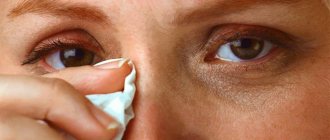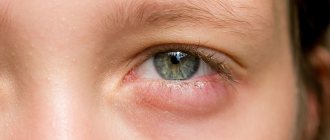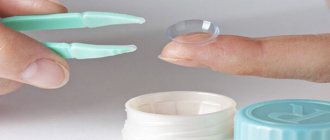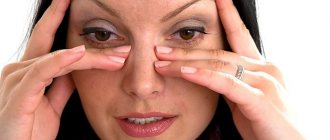Watery and itchy eyes may be associated with frequent work at the computer, a deficiency of tear fluid, or an allergic reaction. Often such symptoms accompany inflammatory diseases of the organ of vision. You can determine the reason why your eyes are watery and itchy by consulting an ophthalmologist. The doctor will also select the right therapy that will speed up the recovery process and prevent the development of complications.
Causes
If the eye is watery and itchy, it is necessary to determine the factors that could lead to such complaints. A large number of pathologies will have to be excluded, such as:
- prolonged tension in the muscle structures of the eye during minor work or working at a computer;
- wearing incorrectly fitted lenses or using them for a long time when fitted correctly; more about the dangers of wearing lenses for a long time →
- prolonged reading in insufficient light;
- vitamin deficiency (lack of vitamins B2, E, A), which leads to the fact that first one eye will water, and then both at once;
- inflammatory process - due to a bacterial infection, it can lead to damage to one of the eyes, and if the therapy is incorrect, damage to the second eye will also occur;
- in case of a burn or injury from a foreign object, corresponding complaints may arise;
- with rhinitis of allergic or cold origin, one or both eyes may itch and water at once;
- Various types of blepharitis can provoke damage to one eye.
The exact causes of the development of the pathology can only be determined after the affected area is examined by a doctor. Consultation with a doctor is mandatory, since there are many factors that can answer the question of why complaints appeared.
Wearing contact lenses
Any foreign body that enters the cornea of the eye can cause irritation, and contact lenses are no exception. While the eyes are not accustomed to the lenses, redness and lacrimation may occur. Improper use, violation of hygiene rules, use after the expiration date - all this also provokes a painful condition.
Clinical manifestations
Depending on the cause that led to the appearance of tearing and itching, additional clinical symptoms may be added. These include:
- pain - severe pain in the internal structures of the eye;
- hyperemia - excessive blood filling of small vessels, which causes redness of the affected area;
- the appearance of pathological discharge (all discharge from the eye, except tear fluid).
Additional symptoms can help the doctor more accurately determine the causes of complaints and, accordingly, select the most appropriate treatment method.
Localization of itching
The localization of itching is another important factor that helps the doctor determine the causes of the pathology. Itching can bother a person mainly in the corners of the eyes, or can spread over the eyelids. In the first case, conjunctivitis is most often diagnosed.
In the second, the following pathologies are possible:
- the use of cosmetics with high allergenicity or poor quality in adults often causes itching of the eyelids;
- severe fatigue;
- dust particles entering the surface of the eye;
- wearing lenses for a long time or incorrectly installing them; learn more about how to properly put on and remove lenses →
- incorrectly chosen eye drops.
In some cases, it is possible to diagnose a common cold as a provoking factor, which also often leads to itching and increased tearing of the eyes.
"Vizin"
This is another remedy that is widely popular for eye problems. However, before you start taking Visin drops, the instructions for use must be studied without fail.
The main component of the product is tetrizoline. "Vizin" has a vasoconstrictor effect, quickly relieves itching, swelling, burning and redness. Therefore, these drops are very popular.
The instructions for using Vizin drops note that the product can help if allergic reactions were caused by the use of bad cosmetics and by wearing contact lenses for a long time. The drug will help with exposure to smoke, dust and other irritants.
If we talk about contraindications, then you should not use Visin if a person suffers from individual intolerance to the drug, high blood pressure, dystrophic changes in the cornea, hyperthyroidism, dry eye syndrome, tumors in the adrenal glands.
Also, before taking the product, you should consult with an ophthalmologist for those diagnosed with diabetes or coronary heart disease. The drug is prohibited for children under two years of age.
Which doctor should I contact if one eye is watery and itchy?
What to do if your eyes are watery and itchy, or just one? First of all, it is recommended to consult an ophthalmologist. An ophthalmologist, having carried out a diagnosis and assessed the general condition of the patient, will be able to suggest what may be causing one eye to water and itch and, if this is not his profile, will give a referral to another doctor.
If a person suffers from a frequent runny nose of any nature, he will be referred to an otolaryngologist. If the reason is vitamin deficiency, then it will be recommended to see a therapist. At his discretion, the ophthalmologist can involve any additional specialists to help the patient get rid of unpleasant symptoms.
Preventive measures
If you do not want to deal with such an unpleasant phenomenon as swelling of the eyelids, carefully monitor your health and regularly follow all the recommendations of ophthalmologists:
- The first thing you need to pay attention to is your diet. Eliminate spicy and salty foods from your diet, as well as alcoholic drinks and smoked foods, and excess fluid will not accumulate in your body, which can lead to swelling.
- It is very important to provide your body with proper rest. Sleep at least six hours a day in a well-ventilated room.
- If you work at a computer monitor, purchase special glasses with protective lenses. This will give you extra protection for your eyes. Don’t forget to give your eyes a rest from time to time by doing visual exercises.
- Use only high-quality, proven cosmetics, and do not forget to observe the rules of personal hygiene.
Diagnostics
Only a specialist can determine the factors that led to the fact that one eyelid or one of the corners of the eye is very watery and itchy. Often, a simple examination and thorough questioning of the patient is enough for an ophthalmologist to identify the underlying cause.
If the data obtained during the survey and inspection is insufficient, special techniques can be used. For example, the patient may have the lacrimal sac and its ducts examined with dyes to make sure there is no blockage.
Additionally, if the diagnosis is unclear, radiographic techniques can be used. If an infectious pathology is suspected, discharge from the eyes can be taken for culture or the eyelashes examined using a microscope.
Only after a thorough diagnosis can a doctor attribute the appearance of symptoms to ordinary eye fatigue. This is done if none of the studies gave a specific result that would allow a more definite diagnosis.
Ophthalmic diseases
- Conjunctivitis is an inflammatory lesion of the mucous membrane of the eye.
The pathological process causes unpleasant symptoms in the form of tearing and pain, and the eyes can also itch. The eyes turn red and hurt. As inflammation develops, headaches and photophobia occur. Itching in the eyes most often occurs with allergic conjunctivitis.
- Keratitis is inflammation of the cornea.
With keratitis, the eyes turn red and a foggy haze appears. The inflammatory process causes photophobia and lacrimation. Attacks of cephalalgia occur due to the fact that nerve endings located in the eyeball and transmitting signals to the brain react to inflammation. And also as a result of infection of the body by pathogenic microorganisms.
- Blepharitis is a bilateral inflammation of the ciliary edge of the eyelids.
The disease causes redness and swelling of the edges of the eyelids, sometimes the corners of the eyes near the bridge of the nose itch, and increased sensitivity to bright light, which causes lacrimation.
- Glaucoma is a visual impairment with increased intracranial pressure.
With glaucoma, pain, pain and itching in the eyes occur, and vision deteriorates. Patients experience cephalalgia and aching sensations in the superciliary area. Attacks can occur with nausea and vomiting, pain in the heart, in the abdomen.
- Dry eye syndrome is insufficient moisture in the cornea of the visual organs.
Excessive dryness causes itching, burning, and a feeling of sand in the eyes. Prolonged discomfort provokes headaches, fatigue, and increased sensitivity to light.
- Trichiasis is an abnormal direction of eyelash growth.
The hairs touch the mucous membrane, causing the eyes to water and itch. In addition, eyelashes can injure the conjunctiva and cause decreased vision.
- Cataract is a pathology of the lens that causes clouding and decreased visual acuity.
With cataracts, sensitivity to bright light increases, which causes tearing and itching.
- Keratoconus is dystrophic changes in the cornea that lead to impaired and decreased vision.
Keratoconus causes increased sensitivity to light and eye irritation. As a result, they become watery and itchy. Itching and burning are accompanied by rapid fatigue of the visual organs.
You will learn more about one of the causes - conjunctivitis - in the following video:
Treatment
If one eye is watery and itchy for a long time, then treatment is carried out only under the supervision of a doctor, so as not to aggravate the situation. Before starting therapy, the cause of the pathology is established in order to influence it, and not just fight the symptoms.
Allergic reaction
Allergies are a common reason why one eye may be constantly itchy and watery. To eliminate unpleasant symptoms in this case, antiallergic drugs of both local and systemic action are used.
To eliminate sensitization at the systemic level, tablets are used, such as Tavegil, Diphenhydramine, Zodak, etc. It is recommended to drop Kromohexal, Opatano, Lecrolin and other similar drugs locally into the eye.
It is important to treat not only the affected eye and eliminate the systemic reaction. It is also necessary to act on the nose, since its mucous membrane is also highly susceptible to allergens. For this, it is also recommended to use drops (Allergodil, Cromohexal, etc.), which will reduce the susceptibility to allergens in the nostril.
Inflammatory process
If the main cause is an inflammatory process, which can be caused by both a cold and more serious systemic diseases, the use of anti-inflammatory drugs is recommended.
Taking drugs is possible both systemically and locally, depending on the type of pathology. The anti-inflammatory drug should be chosen by the doctor, since the patient may also need local use of hormonal drugs.
Infection
If the cause lies in an infection of the eye, you will have to use local antibiotics. The choice of remedy depends on the pathogen. Without knowing the causative agent of the pathology, you cannot use antibiotics for eye drops.
"Albucid"
The main component of this product is sodium sulfacyl. This substance has a local effect and quickly penetrates the structures of the eye. Albucid eye drops, the price of which in a pharmacy is about 55 rubles, help destroy germs and quickly get rid of redness, burning, pain and other unpleasant symptoms. In addition, the product prevents the process of reproduction of infection and pathogenic microorganisms.
If we talk about using the product, then 1-2 drops are required three times a day. You can purchase a 20 and 30 percent solution of the drug at the pharmacy. For children, it is recommended to use a less concentrated product (20%).
Due to their effectiveness and low price, Albucid eye drops are very popular. However, this remedy is not indicated for everyone. For example, you should not use the drug if the patient has an individual intolerance to the main component of the drug. Those who additionally take diuretics, as well as people suffering from diabetes, should also be careful.
There are also side effects. For example, if a person exceeds the dosage, this can provoke even greater burning and swelling. In such a situation, you need to reduce the amount of product used.
What to do when your eyes itch and water, what drops to use? It is worth paying attention to other effective means.
Traditional methods
There are a number of folk methods to help get rid of itching. They will help relieve symptoms if it is not possible to see a doctor right away. They cannot be used as a full-fledged treatment!
If one of your eyes is constantly watering or itching, it is recommended:
- use a decoction of chamomile or calendula to wash the affected area, wash 3-4 times a day;
- lotions with plantain and cornflower are suitable if the cause of the problem is known, for example, dust that has gotten into the eyes;
- a warm compress of tea leaves is also suitable to get rid of the problem;
- potatoes, grated and wrapped in gauze, which are placed on the sore eye for 20–25 minutes.
All folk recipes are a temporary measure, which is recommended to be used with the utmost caution. If you are allergic to any of the ingredients, it is recommended to choose another recipe that does not use a dangerous plant.
"Gentamicin"
This type of drug belongs to antibiotics. It is often used for barley, blepharitis, conjunctivitis and allergic inflammation. Often, Gentamicin eye drops are prescribed after eye surgery.
If we talk about the method of taking the drug, it is recommended to instill 1-2 drops per eye 4-6 times a day. The course of treatment is prescribed by a doctor, but regardless of this, it is not recommended to use the product for more than 14 days. In this case, a person may develop resistance to the pathogens of the disease.
It is also worth noting that Gentamicin eye drops also have a fairly extensive list of side effects. First of all, it is worth considering that drugs of this type suppress the body’s immune system. In addition, while taking this drug, the following may develop:
- Severe allergic reaction.
- Increased pressure inside the eyes.
- Dendritic keratitis.
- Perforated ulcers of the cornea of the eyes.
- Fungal infection.
- Inflammatory process in the auditory nerve.
Prevention
Prevention primarily consists of following basic hygiene rules (put on lenses only after washing your hands, do not rub your eyes with dirty hands). You also need to remember about your work and rest schedule and eat right. These simple measures will help significantly reduce the likelihood of experiencing tearing and itching in one eye.
Adequate sleep is another factor necessary for maintaining eye health. Additionally, it is recommended to choose the right cosmetics, giving preference to proven brands, and give up bad habits that reduce the body’s resistance to negative harmful influences and can indirectly affect eye health. The selection of glasses and lenses should be treated with the utmost care.
If a person complains of tearing and itching in one eye, it is recommended that he consult a doctor. Self-treatment with traditional methods is permissible only as a temporary measure, if it is not possible to immediately visit a specialist.
It is much easier to prevent eye diseases or begin to fight them in the early stages of development than to treat advanced pathology later.
Author: Arina Volkova, doctor, especially for Okulist.pro











